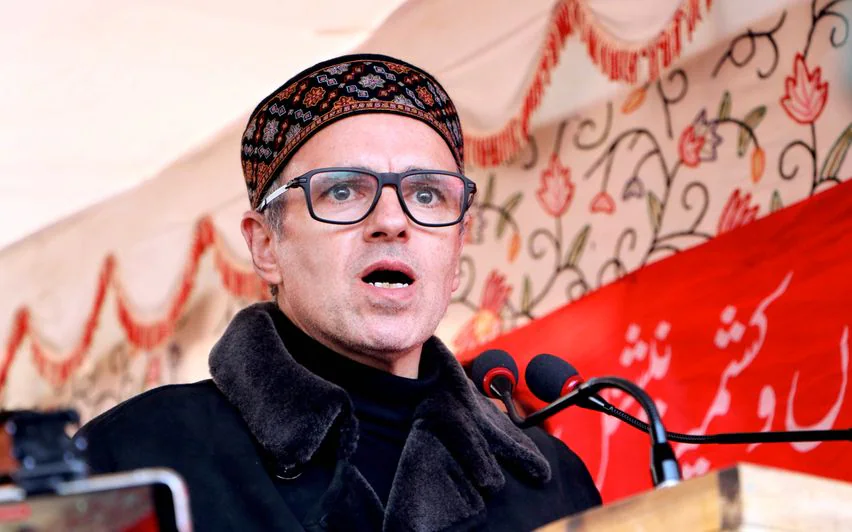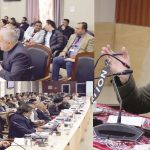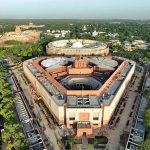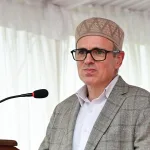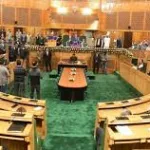Says delay in restoring statehood erodes trust between J&K & Center
‘Dialogue with Pak key to lasting peace in J&K’
Calls for secure & thoughtful return of Kashmiri Pandits
SRINAGAR, Dec 16: Chief Minister Omar Abdullah on Monday emphasised that the resolu-tion passed during the recent assembly session intentionally avoided terms like “Article 370” in order to maintain a focus on the broader goal of restoring Jammu and Kashmir’s special status and constitutional guarantees.
In an interview with a national television channel, Abdullah clarified that the resolution adopted was significantly stronger than an earlier draft that had not referenced Article 370 at all.
Reflecting on the resolution’s passage, Abdullah stated that those who initially supported it later expressed opposition, despite having congratulated him after the session.
On the matter of statehood, Omar reiterated that the central government’s promise to restore statehood to Jammu and Kashmir must be upheld, as it was publicly made to both the people of J&K and the nation. He acknowledged the delay in fulfilling this commitment, but insisted that promises made in Parliament should not be taken lightly. He added that while specific timelines were not outlined, the promise remains a firm commitment from the government.
The delay, he warned, has eroded trust between the people of J&K and the central government. “Statehood is not just about status, but about dignity, identity, and self-respect. The longer the delay, the harder it will be to rebuild the trust that has been lost,” Omar said. He expressed hope that the Home Minister’s recent commitment to initiate consultations on restoring statehood would help restore confidence among the people of J&K.
Omar also addressed questions on the necessity of dialogue with Pakistan, stating that despite the ongoing tensions and terrorist attacks in J&K, such talks remain essential. “Creating an envi-ronment conducive to talks is not just India’s responsibility; it is also Pakistan’s. Pakistan must take steps to address concerns related to attacks, like the 26/11 Bombay attack and the situation in J&K,” he explained.
Citing the late BJP leader Atal Bihari Vajpayee’s famous quote, “We can change our friends, but we cannot change our neighbours,” Omar stressed the importance of dialogue, framing it not as a luxury, but as a necessity for lasting peace in J&K. While both sides must show goodwill, he un-derscored that Pakistan needs to demonstrate its commitment to peace by ceasing cross-border terrorism.
The Chief Minister expressed his belief that peace is achievable if both nations demonstrate polit-ical will and sincerity, although he refrained from commenting on the central government’s cur-rent stance on the issue.
On the security situation in J&K, Omar acknowledged improvements in certain areas, but noted that challenges persist. While terrorism has decreased since the 1990s and early 2000s, sporadic incidents of violence continue to occur, he added.
Addressing the issue of the return of Kashmiri Pandits, Omar stressed the importance of their return but emphasized that it cannot be forced. “The return of Kashmiri Pandits is imperative, but it must be done with a sense of security,” he said, acknowledging that the Pandits’ displacement was largely due to the lack of safety. The rehabilitation process, he noted, must focus on restor-ing trust and ensuring safety for those wishing to return.
Omar revealed that his government is working on creating composite townships in Kashmir where both Pandits and Muslims can live side by side. The government is also planning to reserve jobs and educational opportunities for Kashmiri Pandit youth to encourage their return. “This sensitive issue requires patience, empathy, and a thoughtful approach,” he remarked.
Looking back on J&K after the abrogation of Article 370 in 2019, Omar stated that the region has faced significant disruptions. Industries such as handicrafts, tourism, and horticulture have been hit hard. To address these challenges, his government is focusing on three main areas: reviv-ing tourism through sustainable initiatives in both popular and lesser-known areas, empowering local industries, and creating employment opportunities for the region’s youth through skill de-velopment and collaboration with both public and private sectors.
Omar also tackled concerns about radicalization among J&K’s youth, attributing it to alienation and lack of opportunities. “Our government is focusing on education and employment initiatives that include youth in the political process. We are collaborating with community leaders and reli-gious organizations to counter extremist narratives,” he explained. At the same time, he empha-sized the need for security forces to handle such issues with sensitivity to avoid further alienating the youth.
Later, Omar discussed his relationship with the central government, describing it as professional despite differences in political ideologies. “As Chief Minister, my primary responsibility is to-wards the people of J&K, and maintaining a working relationship with the central government is essential for governance and development,” he said.


